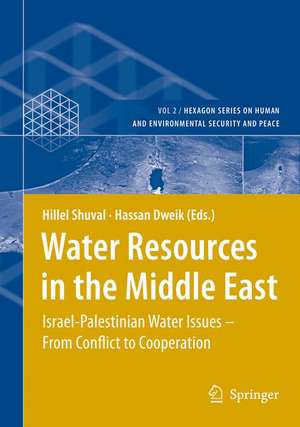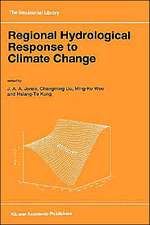Water Resources in the Middle East: Israel-Palestinian Water Issues – From Conflict to Cooperation: Hexagon Series on Human and Environmental Security and Peace, cartea 2
Editat de Hillel Shuval, Hassan Dweiken Limba Engleză Hardback – 18 mai 2007
| Toate formatele și edițiile | Preț | Express |
|---|---|---|
| Paperback (1) | 968.96 lei 43-57 zile | |
| Springer Berlin, Heidelberg – 11 noi 2010 | 968.96 lei 43-57 zile | |
| Hardback (1) | 975.10 lei 43-57 zile | |
| Springer Berlin, Heidelberg – 18 mai 2007 | 975.10 lei 43-57 zile |
Preț: 975.10 lei
Preț vechi: 1189.16 lei
-18% Nou
Puncte Express: 1463
Preț estimativ în valută:
186.61€ • 194.10$ • 154.06£
186.61€ • 194.10$ • 154.06£
Carte tipărită la comandă
Livrare economică 14-28 aprilie
Preluare comenzi: 021 569.72.76
Specificații
ISBN-13: 9783540695080
ISBN-10: 3540695087
Pagini: 472
Ilustrații: XIV, 454 p.
Dimensiuni: 203 x 276 x 31 mm
Greutate: 1.3 kg
Ediția:2007
Editura: Springer Berlin, Heidelberg
Colecția Springer
Seria Hexagon Series on Human and Environmental Security and Peace
Locul publicării:Berlin, Heidelberg, Germany
ISBN-10: 3540695087
Pagini: 472
Ilustrații: XIV, 454 p.
Dimensiuni: 203 x 276 x 31 mm
Greutate: 1.3 kg
Ediția:2007
Editura: Springer Berlin, Heidelberg
Colecția Springer
Seria Hexagon Series on Human and Environmental Security and Peace
Locul publicării:Berlin, Heidelberg, Germany
Public țintă
ResearchCuprins
Geopolitical Israeli-Palestinian Water Issues.- Meeting Vital Human Needs: Equitable Resolution of Conflicts over Shared Water Resources of Israelis and Palestinians.- Shared Management of Palestinian and Israeli Groundwater Resources: A Critical Analysis.- Beyond the Watershed: Avoiding the Dangers of Hydro-Centricity and Informing Water Policy.- Politics and Water Management: A Palestinian Perspective.- Perceptions of Water in the Middle East: The Role of Religion, Politics and Technology in Concealing the Growing Water Scarcity.- The Karstic Flow System in Uja Area — West Bank: An Example of two Separated Flow Systems in the Same Area.- Trans-boundary Regional Issues: Jordan River and Dead Sea.- Options for a More Sustainable Water Management in the Lower Jordan Valley.- A Water For Peace Strategy for the Jordan River Basin by Shifting Cropping Patterns.- A Future for the Dead Sea Basin: Water Culture among Israelis, Palestinians and Jordanians.- Formulating A Regional Policy for the Future of the Dead Sea — The ‘Peace Conduit’ Alternative.- Water Trade and Water Markets.- Water Management, Infrastructure, Negotiations and Cooperation: Use of the WAS Model.- ‘Virtual Water’ in the Water Resource Management of the Arid Middle East.- Virtual Water Trade as a Policy Instrument for Achieving Water Security in Palestine.- Water Conflicts and International Water Markets.- Water Imports in the Middle East.- Turkish Water Exports: A Model for Regional Cooperation in the Development of Water Resources.- Water Transfer from Turkey to Water-Stressed Countries in the Middle East.- Manavgat River Water: A Limited Alternative Water Resource for Domestic Use in the Middle East.- Socioeconomic Development and Benefit Sharing in the Euphrates-Tigris River Basin.- WaterCo-operation and Conflict Resolution.- Why States Co-operate over Shared Water: The Water Negotiations in the Jordan River Basin.- Joint Mismanagement: Reappraising the Oslo Water Regime.- Violations, Opportunities and Power along the Jordan River: Security Studies Theory Applied to Water Conflict.- U.S. Sponsored Conflict Resolution Through Cooperation in the Water Sector.- Water Allocation for Nature and the ‘End of Conflict’ Era.- Allocating Gaps of Shared Water Resources (Scarcity Index): Case Study on Palestine-Israel.- Factors Relating to the Equitable Distribution of Water in Israel and Palestine.- Groundwater Management in a Cross Boundary Case: Application to Israel and the Palestinian Authority.- Feasibility Study for Cooperation in Wastewater Treatment Plants and Landfills for Israelis and Palestinians in the West Bank.- Effects of the Separation Barrier on the Viability of a Future Palestinian State.- Water as a Human Right: Understanding of Water in the Arab Countries of the Middle East.- International Water Law.- Legal Framework of Groundwater Management in the Middle East (Israel, Jordan, Lebanon, Syria and the Palestinian Territories).- Palestinian Water Authority: Developments and Challenges — Legal Framework and Capacity.- Water Resource Management.- Water Demand Management as Governance: Lessons from the Middle East and South Africa.- Water Demand Management — A Strategy to Deal with Water Scarcity: Israel as a Case Study.- Using Socio-economic Indicators for Integrated Water Resources Management: Case Study of Palestine.- Israeli Water Use Patterns: Resource Conservation and Transboundary Security.- Holistic Regional Approach to Water Management.- Impact of Climate Change.- Impacts of Global Environmental Change for Water Resources of Israeland its Neighbors: New Security Dangers and Shifting Perceptions.- Mitigating Negative Impacts of Global Warming on Water Resources of the Middle East.- The Past as a Key for the Future: Mutual Dependencies of Land Use, Soil Development, Climate and Settlement.- Water and Wastewater Technology in the Middle East.- Waste Water Management and Reuse in Jordan.- Reducing the Environmental Impact of Olive Mill Wastewater in Jordan, Palestine and Israel.- A Seeping Timebomb: Pollution of the Mountain Aquifer by Sewage.- Potential Use of New Geological Findings for Water Exploitation in the Lower Jordan Valley.- From ‘Emergency Response Coordination’ to ‘Humanitarian Protection’: The Role and Activities of the Emergency Water And Sanitation-Health (EWASH) Committee.
Notă biografică
Professor HILLEL SHUVAL is Director of the Department of Environmental Health Sciences at the Hadassah Academic College-Jerusalem and Professor Emeritus at the Hebrew University of Jerusalem, Israel. He served as initiator and co-chairman of the First and Second Israeli-Palestinian International Conferences on Water held in Zurich in 1992 and Antalya, Turkey, 2004.
Professor HASSAN DWEIK is a Professor of Polymer and Industrial Chemistry at the Al-Quds University in Jerusalem; he served as the co-Chairman of the Second Israeli-Palestinian International Conference on Water in Antalya in 2004. He is Executive Vice President at Al-Quds University. He has published many articles on environmental issues in Palestine, in particular on water pollution and solid waste management.
Professor HASSAN DWEIK is a Professor of Polymer and Industrial Chemistry at the Al-Quds University in Jerusalem; he served as the co-Chairman of the Second Israeli-Palestinian International Conference on Water in Antalya in 2004. He is Executive Vice President at Al-Quds University. He has published many articles on environmental issues in Palestine, in particular on water pollution and solid waste management.
Textul de pe ultima copertă
In Water Resources in the Middle East: Israel-Palestinian Water Issues - From Conflict to Cooperation leading Palestinian, Israeli and international water experts document the importance of mutual understanding, respect and amity among peoples during a difficult period of stress. This book demonstrates hope, optimism and the belief that people with good will can help contribute to peace and mutual cooperation in solving shared water problems essential for their mutual survival and welfare. The present water crisis facing the Middle East will become even more severe over the next twenty years, unless dealt with energetically and in good time. This situation requires urgent action by the countries of the region, the international community and civil society generally.
This book provides valuable source material for water scientists, engineers, political scientists, specialists in conflict resolution, environmentalists, economists, lawyers, administrators, managers and policy makers interested in understanding, developing, managing and protecting the scarce shared water resources of the Middle East and for the promotion of "Water for Life" for the benefit of all the nations of the region.
This book provides valuable source material for water scientists, engineers, political scientists, specialists in conflict resolution, environmentalists, economists, lawyers, administrators, managers and policy makers interested in understanding, developing, managing and protecting the scarce shared water resources of the Middle East and for the promotion of "Water for Life" for the benefit of all the nations of the region.

















